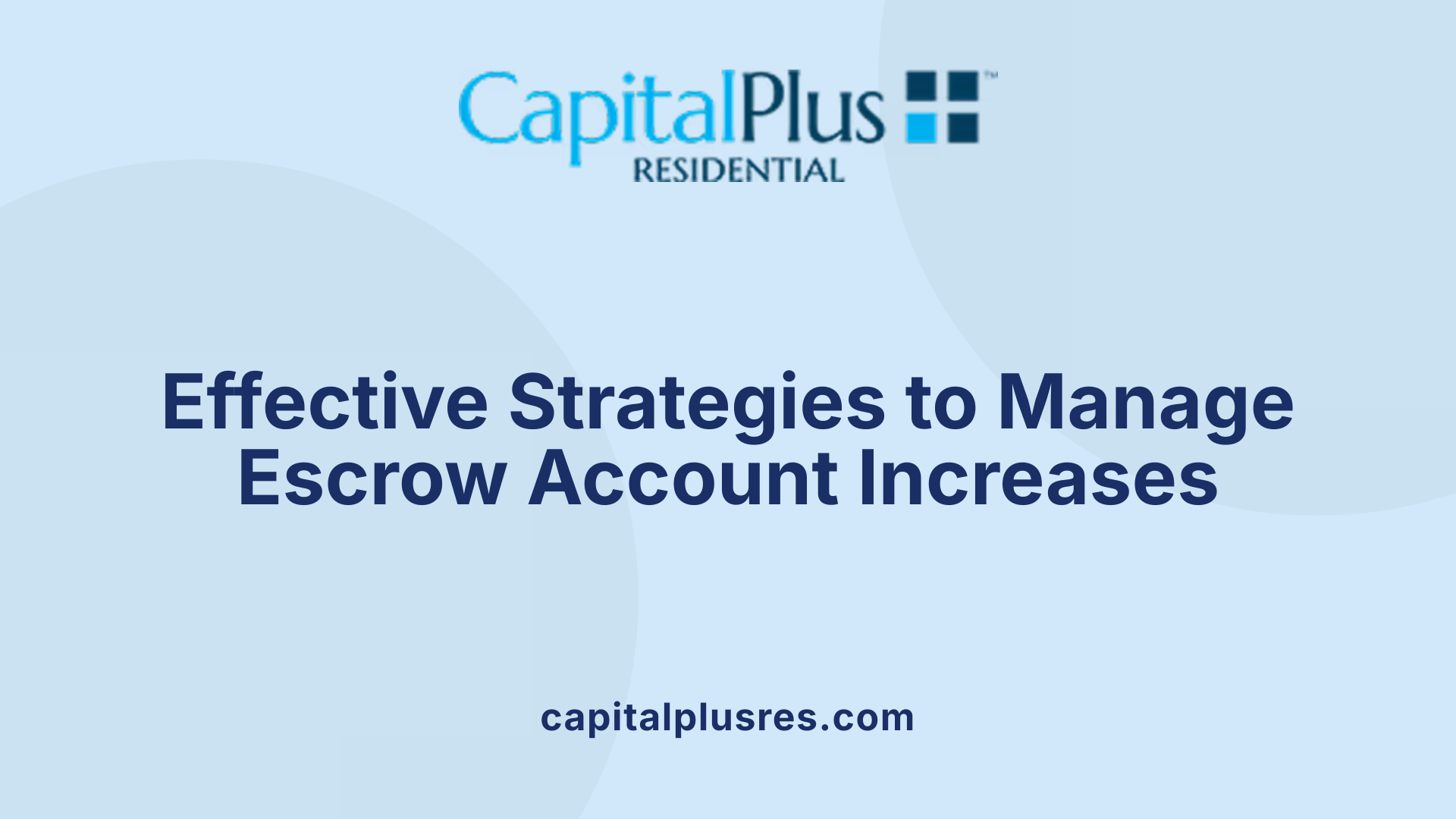Understanding the Impact of Increasing Property Taxes and Insurance Costs
Homeowners across the country face growing financial challenges due to rising property taxes and homeowners insurance premiums. These increases, driven by surging property values, inflation, and climate-related risks, affect monthly mortgage payments and overall housing affordability. This article explores practical options and strategies that homeowners and homebuyers can use to manage these escalating costs effectively.
Why Property Taxes and Homeowners Insurance Are Rising and What It Means for Homeowners

What Causes Property Taxes to Increase?
Property tax hikes often result from surging property values and government budget needs. Between 2019 and 2023, property values have jumped around 40%, prompting many local governments to reassess and increase tax bills accordingly. For instance, in Illinois, typical homeowners have seen property tax bills rise by approximately $756 over five years. Additionally, reassessments may be triggered periodically, causing fluctuations even if market values change.
Why Are Homeowners Insurance Premiums Climbing?
Several factors drive rising insurance rates. Severe weather events like hurricanes, floods, and wildfires have increased claim costs. Inflation and soaring rebuild expenses also push premiums up. Nationally, insurance premiums climbed about 11% in 2023, with some high-risk states reporting rises of 40% or more due to climate change and limited insurer competition. The average U.S. premium now stands near $2,377 annually.
How Do These Increases Affect Escrow Accounts and Mortgage Payments?
Homeowners’ escrow accounts, used by mortgage servicers to pay taxes and premiums, are directly impacted. As property taxes and insurance premiums climb, lenders must collect more monthly, raising total mortgage payments. Escrow shortages can occur, creating surprises unless homeowners save modest amounts (e.g., $50–$100) monthly. Understanding and reviewing escrow statements helps avoid unexpected payment spikes.
Are There Regional Differences in Cost Jumps?
Yes. States prone to climate risks, such as Florida, face especially steep insurance hikes—premiums in cities like Miami may exceed 2% of property value, a level deemed unsustainable. This leads some homeowners to relocate to inland or lower-risk areas. Property tax rates also vary by local government policies and budget requirements.
Retail Strategies for Homeowners:
- Regularly shop around for insurance quotes to find better rates.
- File for homestead exemptions to lower property taxes.
- Contest property valuations if assessed values appear inflated.
- Consider housing options like condominiums with bundled insurance policies.
Navigating these rising costs requires proactive budgeting and informed decision-making to maintain financial stability.
| Factor | Impact on Costs | Notes |
|---|---|---|
| Property Value Increase | Drives higher assessed taxes | 40% rise from 2019-2023 |
| Severe Weather Events | Raises insurance premiums | Hurricanes, floods, wildfires |
| Inflation/Rebuild Costs | Pushes premiums up | Increased construction expenses affect rebuild estimates |
| State Risk Level | Influences premium variability | High-risk states face sharper increases |
| Escrow Account Changes | Affects mortgage payment amounts | Monthly payments rise as taxes and premiums increase |
| Tax Exemptions/Appeals | Can reduce tax burden | Homestead exemptions and assessment challenges offer relief |
Options to Manage Increasing Property Taxes and Insurance Costs Within Escrow Accounts

What Is the Function of Escrow Accounts?
Escrow accounts are setup by mortgage servicers to manage payments for property taxes and homeowners insurance on behalf of the borrower. These accounts collect money monthly, ensuring funds are available when tax bills and insurance premiums are due.
How Do Increased Property Taxes and Insurance Premiums Affect Monthly Mortgage Payments?
When property taxes or insurance premiums rise, mortgage servicers adjust escrow contributions accordingly. This means monthly payments may increase to cover the higher costs. For example, recent years have seen some property tax bills increase by hundreds of dollars annually, and homeowners insurance premiums have risen as much as 11% nationally in 2023.
Why Is It Important to Review Property Tax Reassessments and Insurance Notices?
Homeowners should carefully review reassessments and insurance renewal notices each year. Understanding these changes helps anticipate escrow adjustments. It also offers an opportunity to appeal property valuations if inaccurately assessed or shop for better insurance rates if premiums become too costly.
How Can Homeowners Prepare for Escrow Shortages?
Since taxes and insurance fluctuate annually, small escrow shortages can occur. Homeowners are advised to set aside monthly savings—around $50 to $100—to cushion these adjustments. Planning ahead prevents sudden payment shocks and maintains steady mortgage budgeting.
Together, understanding escrow workings, actively monitoring changes, and proactive saving can help manage the impact of rising property taxes and insurance costs on monthly mortgage payments.
Strategies Homeowners Can Adopt to Reduce Property Tax and Insurance Burdens

Applying for Homestead Exemptions
One effective way to reduce property tax obligations is by filing for a homestead exemption. This tax break is available for a primary residence and can lower the taxable value of the property, thus decreasing the annual property tax bill. Homeowners should check with their local tax authority to determine eligibility and application procedures.
Contesting Property Tax Assessments
Property tax increases often result from local government reassessments. Homeowners have the right to appeal their assessed property value if they believe it is inaccurate. Contesting an inflated assessment can potentially reduce tax liability and lead to lower escrow requirements. Reviewing reassessment notices carefully is essential to spot any discrepancies.
Shopping and Comparing Homeowners Insurance Regularly
Insurance premiums tend to increase annually. Homeowners are encouraged to shop for homeowners insurance at least once every one or two years. Comparing quotes from different insurers can uncover more competitive rates and coverage options, helping to manage rising escrow contributions.
Using Insurance Brokers for Better Rates
Working with an experienced insurance broker can further help homeowners navigate various policy options and negotiate better premiums. Brokers can provide insights into discounts, suitable coverage levels, and regional risk factors to optimize insurance costs.
Adjusting Deductibles and Bundling Policies
Increasing insurance deductibles can lower premium costs, though homeowners should ensure they can afford the higher out-of-pocket expense if claims arise. Bundling homeowners insurance with other policies, like auto insurance, often qualifies for multi-policy discounts, reducing overall expenses.
Considering Housing Options Like Condominiums with Master Policies
Some homeowners are opting to live in condominiums where a master homeowners association (HOA) policy covers the building structure, lowering individual insurance premiums. This strategy reflects adapting housing choices to manage insurance affordability.
Relocating or Downsizing to Lower-Risk Areas
Rising climate-related insurance costs are prompting some to move to areas with lower natural disaster risk and more affordable insurance premiums. Inland states or regions perceived as less vulnerable to floods and hurricanes may offer financial relief. Downsizing to smaller homes can also reduce both tax and insurance costs.
These approaches can collectively help homeowners navigate the upward trends in property taxes and insurance premiums, making homeownership more sustainable amid rising costs.
How Mortgage Brokerage and Residential Lending Services Support Homebuyers Amid Rising Housing Costs

What are mortgage brokerage services and how do they assist homebuyers?
Mortgage brokerage services serve as intermediaries who help homebuyers find and secure mortgage loans that best fit their financial situation. Mortgage brokers have access to a broad network of lenders, including many wholesale lenders not available to the general public. This allows them to compare multiple loan options and secure better mortgage rates. They streamline the loan process by managing paperwork and guiding buyers through complex applications, often saving time and reducing errors. Importantly, mortgage brokers must act in the borrower’s best interest, with most fees paid by lenders rather than borrowers.
How do residential lending services differ from mortgage brokerage services?
Residential lending services are offered directly by financial institutions such as banks or credit unions that originate and fund home loans internally. These providers evaluate the borrower’s finances and typically offer pre-approved loans from their own portfolio. In contrast, mortgage brokers act as independent agents working with multiple lenders to find the best mortgage options tailored to the borrower’s needs. The key difference is that residential lenders provide the loan themselves, while brokers facilitate access to a variety of lenders.
What factors should borrowers consider when choosing a mortgage brokerage service?
When selecting a mortgage broker, borrowers should check the broker’s reputation, licensing, and experience. It’s important to understand the broker's access to a broad lender network, including wholesale and specialized lenders. Fees should be clarified since brokers usually receive payment from lenders but may have additional charges. Prospective homebuyers should interview brokers to assess their professionalism, knowledge, and ability to serve unique financial circumstances like poor credit or unusual property types.
What are the benefits of using a mortgage broker compared to going directly to a lender?
Mortgage brokers offer access to a wide range of loan products and lenders, including options that might not be available directly to borrowers. They streamline the application process by handling documentation and pre-approvals. Brokers are legally required to act in the borrower’s best interest and usually don’t charge fees directly to clients. This approach can save homebuyers money by securing more competitive rates and better loan terms, while offering personalized support throughout the mortgage process.
Incorporating insurance and tax costs in mortgage planning
With recent increases in homeowners insurance and property taxes, rising housing costs impact mortgage payments significantly. Mortgage brokers help homebuyers factor in fluctuating insurance premiums and property tax reassessments when planning affordability. They explain how escrow accounts work to manage these expenses monthly and advise on strategies like shopping for insurance annually or applying for homestead exemptions to reduce costs. By including these variable expenses early on, brokers support borrowers in making sustainable homeownership decisions and avoiding payment surprises.
Additional Financial Tools and Market Trends to Consider When Costs Increase
What is the role of Capital Reserve Accounts in managing unexpected housing costs?
Capital Reserve Accounts, such as the one offered to Sun clients, serve as a financial cushion for homeowners facing unforeseen expenses related to their homes. These accounts help offset sudden surges in property taxes, insurance premiums, or repair costs, reducing stress and preventing payment shocks in monthly mortgage obligations.
How do climate risks affect insurance costs and housing market behavior?
Climate risks like hurricanes, floods, and wildfires are driving up homeowners insurance premiums, especially in high-risk states where premiums can rise by 40% or more. Cities such as Miami have premiums exceeding 2% of property value, considered unsustainable by many. These escalating costs are prompting homeowners to reconsider their location choices.
What are some current market trends in homeowner relocation and housing preferences?
Rising insurance and property tax costs are motivating some homeowners to downsize or relocate to lower-risk, more affordable areas, including inland states with less exposure to natural disasters. Others are choosing condominiums with bundled HOA master policies to reduce insurance premiums, reflecting a shift in housing expectations tied to affordability and risk management.
How can refinancing and mortgage product options help manage increasing payments?
Refinancing is a useful strategy to reduce mortgage payments, particularly by removing Private Mortgage Insurance (PMI) once sufficient equity is built. Mortgage products like temporary buydowns or adjustable-rate mortgages (ARMs) can impact payments over time but require careful planning. Understanding how these options affect payments helps borrowers make informed decisions.
Why is it important for homeowners to review mortgage servicer statements regularly?
Mortgage servicer statements include escrow calculations for property taxes and insurance. Rising costs often increase these escrow contributions, leading to higher monthly payments. Homeowners should review statements carefully to catch errors or discrepancies and communicate with servicers promptly to resolve issues. This vigilance helps avoid unexpected payment increases.
Taking Control of Your Housing Costs
Rising property taxes and homeowners insurance premiums are a reality for many homeowners today, but various tools and strategies can help mitigate their impact. Understanding how escrow accounts work, regularly reviewing bills, and actively managing insurance and tax obligations empower homeowners to avoid surprises. Utilizing mortgage brokerage services offers access to competitive financing options that account for these costs, potentially easing the financial burden. Additionally, exploring exemptions, contesting assessments, and considering changes in housing options or refinancing can provide meaningful relief. With proactive planning and informed choices, homeowners can better adapt to increased expenses and maintain sustainable homeownership.
References
- Tips for Managing Rising Property Taxes and Insurance
- How to Keep Your Mortgage Payment from Rising Every Year
- Where Homeowners Are Moving To Escape Insurance Costs
- 3 Tips to Keep Property Taxes and Insurance Costs From ...
- Rising Homeowners Insurance Costs: How They Impact ...
- Why did my monthly mortgage payment go up or change?
- How home insurance rates affect your mortgage payment
- What Is a Mortgage Broker and How Do They Help ...
- What Is a Mortgage Broker and How Do They Help ...









